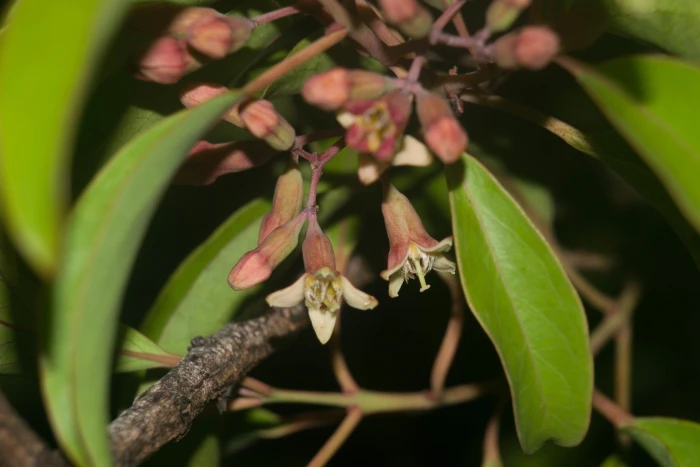Forest Sandalwood
(Santalum freycinetianum)
Forest Sandalwood (Santalum freycinetianum)
/
/

Kevin Faccenda
CC BY 4.0
Image By:
Kevin Faccenda
Recorded By:
Copyright:
CC BY 4.0
Copyright Notice:
Photo by: Kevin Faccenda | License Type: CC BY 4.0 | License URL: http://creativecommons.org/licenses/by/4.0/ | Rights Holder: Kevin Faccenda | Publisher: iNaturalist | Date Created: 2021-10-01T21:50:46-07:00 |
























Estimated Native Range
Climate Requirements
| • Precipitation | 26" - 195" |
| • High Temp. | 76°F - 88°F |
| • Low Temp. | 54°F - 65°F |
Summary
Santalum freycinetianum, commonly known as Forest Sandalwood or ʻIliahi, is a slow-growing, evergreen tree endemic to the Hawaiian Islands. It thrives in a range of habitats including dry, coastal mesic, mixed mesic, and wet forests on Oʻahu, Kauaʻi, Lānaʻi, Maui, and Molokaʻi, typically at elevations of 820-3117 feet. As a root hemi-parasite, it often forms symbiotic relationships with native species such as koa (Acacia koa) and ʻaʻaliʻi (Dodonaea viscosa), from which it derives some of its nutrients.
Forest Sandalwood is notable for its dense, dark green foliage and small, inconspicuous flowers that bloom from March to October. The heartwood is highly valued for its essential oils, historically used by Native Hawaiians for crafting waʻa kaulua (double-hulled canoes) decks and as a natural perfume. Despite its past overharvesting for export, it remains culturally significant and is now often used in reforestation projects and as an ornamental plant in Hawaiian landscapes. In cultivation, it requires well-drained soils and can tolerate a range of light conditions from full sun to partial shade. While it is not commonly found in nurseries, those interested in growing ʻIliahi should ensure a suitable host plant is available for its parasitic roots. Potential problems include habitat loss and overharvesting, which have historically threatened its populations.CC BY-SA 4.0
Forest Sandalwood is notable for its dense, dark green foliage and small, inconspicuous flowers that bloom from March to October. The heartwood is highly valued for its essential oils, historically used by Native Hawaiians for crafting waʻa kaulua (double-hulled canoes) decks and as a natural perfume. Despite its past overharvesting for export, it remains culturally significant and is now often used in reforestation projects and as an ornamental plant in Hawaiian landscapes. In cultivation, it requires well-drained soils and can tolerate a range of light conditions from full sun to partial shade. While it is not commonly found in nurseries, those interested in growing ʻIliahi should ensure a suitable host plant is available for its parasitic roots. Potential problems include habitat loss and overharvesting, which have historically threatened its populations.CC BY-SA 4.0
Plant Description
- Plant Type: Shrub, Tree
- Height: 15-50 feet
- Width: 10-20 feet
- Growth Rate: Slow
- Flower Color: N/A
- Flowering Season: Spring, Summer, Fall
- Leaf Retention: Evergreen
Growth Requirements
- Sun: Full Sun, Part Shade
- Water: Medium
- Drainage: Medium, Fast
Common Uses
Fragrant
Natural Habitat
Dry, coastal mesic, mixed mesic, and wet forests within the specified elevation range on the Hawaiian Islands
Other Names
Common Names: Iliahi, Forest Sandalwood
Scientific Names: Santalum freycinetianum, Santalum freycinetianum var. freycinetianum, Santalum freycinetianum var. longifolium, Santalum longifolium
GBIF Accepted Name: Santalum freycinetianum